Related Research Articles
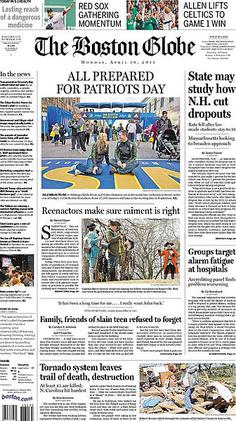
The Boston Globe, also known locally as the Globe, is an American daily newspaper founded and based in Boston, Massachusetts. The newspaper has won a total of 27 Pulitzer Prizes. The Boston Globe is the oldest and largest daily newspaper in Boston and tenth-largest newspaper by print circulation in the nation as of 2023.
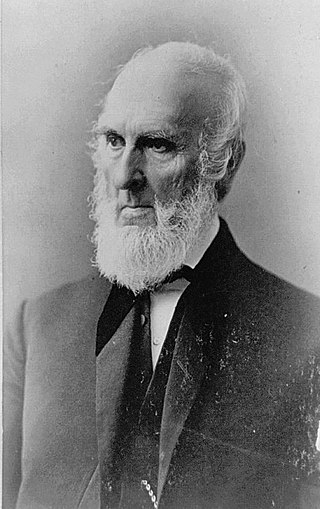
John Greenleaf Whittier was an American Quaker poet and advocate of the abolition of slavery in the United States. Frequently listed as one of the fireside poets, he was influenced by the Scottish poet Robert Burns. Whittier is remembered particularly for his anti-slavery writings, as well as his 1866 book Snow-Bound.

The Courier Journal, also known as the Louisville Courier Journal, and called The Courier-Journal between November 8, 1868, and October 29, 2017, is a daily newspaper published in Louisville, Kentucky and owned by Gannett, which bills it as "Part of the USA Today Network".

Francis Lister Hawks was an American writer, historian, educator and priest of the Episcopal Church. After practicing law with some distinction, Hawks became an Episcopal priest in 1827 and proved a brilliant and impressive preacher, holding livings in New Haven, Philadelphia, New York City and New Orleans, and declining several bishoprics. However, scandals during the 1830s and 40s led him to posts on the American frontier and rejection of his selection as bishop of Mississippi, Hawks was the first president of the University of Louisiana Hawks then moved to Baltimore, Maryland, and eventually returned to New York City.

John Neal was an American writer, critic, editor, lecturer, and activist. Considered both eccentric and influential, he delivered speeches and published essays, novels, poems, and short stories between the 1810s and 1870s in the United States and Great Britain, championing American literary nationalism and regionalism in their earliest stages. Neal advanced the development of American art, fought for women's rights, advocated the end of slavery and racial prejudice, and helped establish the American gymnastics movement.
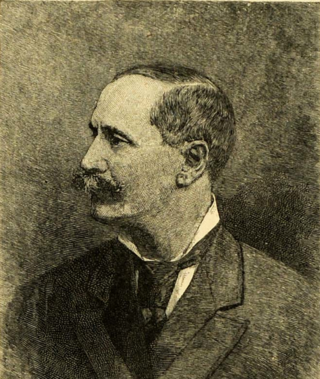
David Dalhoff Neal, was an American artist.
Beginning on July 7, 1834, New York City was torn by a huge antiabolitionist riot that lasted for nearly a week until it was put down by military force. "At times the rioters controlled whole sections of the city while they attacked the homes, businesses, and churches of abolitionist leaders and ransacked black neighborhoods."
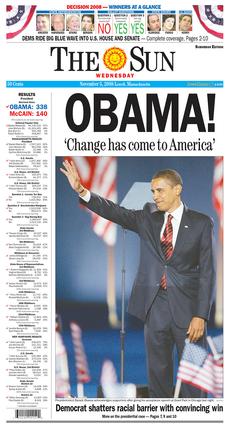
The Sun, also known as The Lowell Sun, is a daily newspaper based in Lowell, Massachusetts, United States, serving towns in Massachusetts around the Greater Lowell area and beyond. As of 2011, its average daily circulation was about 42,900 copies. It is owned by MediaNews Group of Colorado, which is owned by the hedge fund Alden Global Capital.

George Washington Dixon was an American singer, stage actor, and newspaper editor. He rose to prominence as a blackface performer after performing "Coal Black Rose", "Zip Coon", and similar songs. He later turned to a career in journalism, during which he earned the enmity of members of the upper class for his frequent allegations against them.

Thomas Souness Hamblin was an English actor and theatre manager. He first took the stage in England, then immigrated to the United States in 1825. He received critical acclaim there, and eventually entered theatre management. During his tenure at New York City's Bowery Theatre he helped establish working-class theatre as a distinct form. His policies preferred American actors and playwrights to British ones, making him an important influence in the development of early American drama.
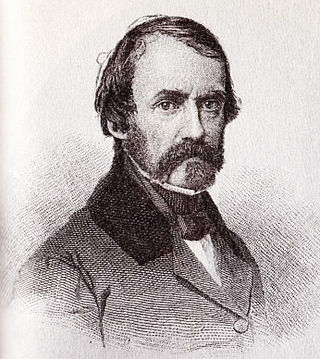
Charles Frederick Briggs, also called C. F. Briggs, was an American journalist, author and editor, born in Nantucket, Massachusetts. He was also known under the pseudonym "Harry Franco", having written The Adventures of Harry Franco in 1839, which was followed by a series of works dealing more or less humorously with life in New York City.

Leonard Joel Baker was an American actor of stage, film, and television, best known for his Golden-Globe-nominated performance in the 1976 Paul Mazursky film Next Stop, Greenwich Village and his 1977 Tony Award-winning performance in the stage play I Love My Wife.
Thompson Cooper was an English journalist, man of letters, and compiler of reference works. He became a specialist in biographical information, and is noted as the most prolific contributor to the Victorian era Dictionary of National Biography, for which he wrote 1,423 entries

Henry Kneebone was an Australian journalist, author, editor and politician.
The New York Courier and Enquirer, properly called the Morning Courier and New-York Enquirer, was a daily broadsheet newspaper published in New York City from June 1829 until June 1861, when it was merged into the New York World. Throughout its existence it was edited by newspaper publisher James Watson Webb. It was closely connected with the rise and fall of the United States Whig Party, and was noted for its careful coverage of New York Harbor shipping news and its close attention to speeches and events in the United States Congress.

William Stevens Robinson was a United States journalist.
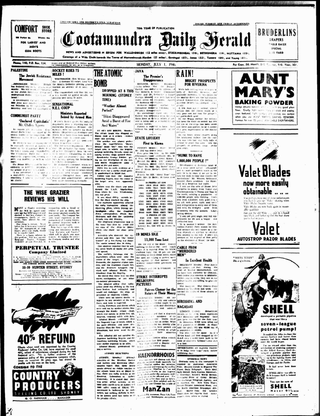
The Cootamundra Herald is a former printed bi-weekly newspaper now existing only on-line and containing little or no news of direct relevance to the community of Cootamundra, New South Wales, Australia. The Herald website carries syndicated non-local copy with occasional government media releases referring to local issues. Following the purchase of the masthead in 2019 by Australian Community Media, the Herald office which had existed for 144 years in the main street was closed and local staff were forced to work part-time from home. The staff resigned or were eventually sacked, and there are now no local Herald employees generating content related to the town.
The Boston Courier was an American newspaper based in Boston, Massachusetts. It was founded on March 2, 1824, by Joseph T. Buckingham as a daily newspaper which supported protectionism. Buckingham served as editor until he sold out completely in 1848, after suffering a severe financial crisis in 1837 and losing much of his editorial authority. The Boston Courier supported the National Republicans, and later the Whig Party. In the period before the American Civil War, its editors, including George S. Hillard and George Lunt, supported the states' right position on the abolition of slavery. From 1867 to 1915 the Boston Courier was a weekly newspaper published by Libbey & Dennison.
"The Present Crisis" is an 1845 poem by James Russell Lowell. It was written as a protest against the Mexican–American War. Decades later, it became the inspiration for the title of The Crisis, the magazine published by the National Association for the Advancement of Colored People.
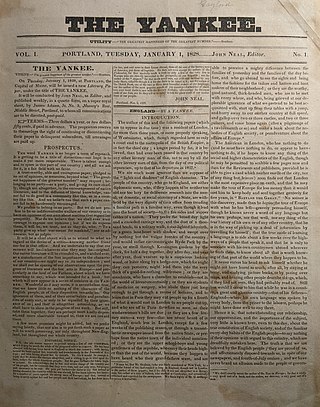
The Yankee was one of the first cultural publications in the United States, founded and edited by John Neal (1793–1876), and published in Portland, Maine as a weekly periodical and later converted to a longer, monthly format. Its two-year run concluded at the end of 1829. The magazine is considered unique for its independent journalism at the time.
References
- Cockrell, Dale (1997). Demons of Disorder: Early Blackface Minstrels and Their World. Cambridge University Press.
- Martin, Joseph G. (1886). Martin's Boston Stock Market: Eighty-eight Years, from January, 1798, to January, 1886. Boston.